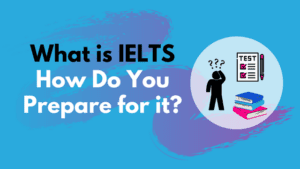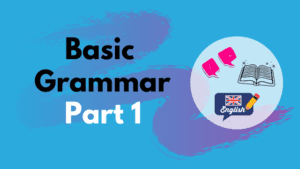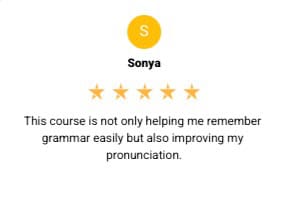How to Easily Improve your Listening and Speaking Skills
There is one thing you can do that will significantly improve both your listening and speaking skills in English.
In this article, I am going to tell you what it is and how to do it!
In fact, let me tell you right now, the key to improving your speaking and listening skills is to use both top-down and bottom-up strategies.
Let me explain what I mean.
Table of Contents
Top-down listening strategies
Top-down means basically taking a bird’s eye view, looking at everything overall, rather than focusing on the details.
In English we often say ‘to look at the bigger picture’ or in this case listening to the bigger picture!
So, the most important top-down strategy is to listen for the main idea.
Don’t try to understand every word. If you try to understand everything, you can’t see the wood for the trees and you get frustrated. Instead, listen for the general meaning.
There are 3 ways we can do this:
1. Use existing knowledge
As you listen or watch, ask yourself –
‘What do I already know about this kind of situation?’
If you are listening to a conversation in a train station, you can use your knowledge of ‘conversations in train stations’ to help you get the overall meaning.
Maybe they will talk about train times, buying tickets, the location of the platform and so on.
2. Listen for key words
Can you identify some key words that will help you understand more or less what is going on?
In our example of the train station, you might hear key words like
How much
A single
Platform
These words will help you get the overall meaning. Maybe in this case, someone wants to buy a single ticket for a trip and needs to know which platform the train leaves from.
3. Use context to guess what’s coming
If you are watching a video, look at the setting and characters. Guess…
- who they are
- where they are
- what they might be talking about
- what might happen next.
Look at the example image below.
Can you predict the next thing that will happen in this situation?

In this scene, we can guess this is a hospital, they may be doctors, they may be talking about patients and maybe their next action is they will visit a patient.
If you were to predict language you may expect to hear words like:
- Operating theatre
- Surgery
- Patient
- Check
- Diagnosis
Predicting what is coming is a great way to help you understand a listening passage.
In summary, all of these strategies can help you get the general idea of any listening passage. However, at other times, the general idea is not enough. You may need to know the details. For this reason, it is a good idea to combine top-down listening strategies with bottom up strategies.
Bottom-up listening strategies
If ‘top-down’ is taking a bird’s eye view, ‘bottom up ‘is taking a worm’s-eye view which means, focusing on details rather than looking at everything overall.
This is useful when watching a video with
- A new character
- A change in plot
- A new idea
- Names
- Numbers
Let’s look at different kinds of bottom-up strategies you can use to improve your listening and speaking skills.
Bottom-Up Strategies
- Notice stressed words
- Notice intonation patterns
- Notice Chunks
1. Notice stressed words
- In English, we don’t pronounce every word equally.
- We stress nouns, adjectives, verbs and adverbs.
So when we say the following sentence aloud,
Caffeine was an amazing aid to the rise of capitalism
Then, we stress certain words like:
Caffeine was an amazing aid to the rise of capitalism
- When listening, listen for the stressed words.

2. Notice intonation patterns
There are no rules for using intonation in English, but there are some patterns we regularly use.
- Open questions:
These usually take a rising tone
Do you like it? ➚
Do you live here? ➚
Do you often go jogging? ➚
- 2-Clause Sentences:
Often the 1st clauses rises, and the 2nd clause falls
If I ate less ➚, I wouldn’t be so fat! ➘
If I had a lot of money ➚, I would buy a house ➘
Before going to work ➚, I have breakfast ➘
- Lists – each time takes rising tone, but last one takes a falling tone
I like coffee ➚, tea ➚and beer➘
Whenever you listen to podcasts or watch videos, listen our for these different intonation patterns. The more you start to notice them, the more you will improve your listening skills.
3. Notice chunks
Listen to individual sentences and notice chunks.
A chunk is a part of speech, usually 3 or 4 words, that create one sound.
For example:
Did you like it?
/Didjelaikit /
Here are a few tips for a successful practice of noticing chunks.
Find a short audio clip, maybe just one sentence.
- Listen to it
- Repeat it
- Identify a chunk
- Read the subtitles
- Try saying it again
A great tool to find audio or video clips that have the transcript or subtitles is Woodpecker Learning.
It also has a tool so you can get short sentences to repeat again and again. Perfect to practice this kind of activity.
Let’s see this strategy in action. Listen to the sentence in the video below
How didyewendup opening up food spots?
You can pick out the chunk
Did you end up
didyewendup
When we look at the tape script we can see the whole sentence:
How didyewendup opening up food spots?
Whenever you are listening to English, try to pick out chunks like this and make a note of them.
In conclusion all these bottom-up strategies will help you listen for details better. Couple them with top-down strategies and in no time you will see your listening skills improve significantly.
Best TV series to improve listening and speaking skills
Finally, let’s look at another way of improving both listening and speaking skills – watching TV series!
TV series are ideal for practicing listening skills but the challenge is finding ones that you like and that are easy enough to follow.
Here are a list of some great TV series that you can watch. I think these are ideal for English learners and also a lot of fun. These are some of my personal favourites 😁
My advice is that you don’t just watch the same kind of series all the time. Try to listen to different,
- Accents
- Contexts
- Genres
Right here we go, my recommendations are…
Action series – Ideal for simple language and lots of visual support.
Killing Eve – A British Spy thriller with suspense, drama and unexpected twists in the plot
His Dark Materials – A fantasy drama based on books by Philip Pullman.
Sitcoms – Ideal for
- natural conversations
- culture references
- learn the sense of humour
Ted Lasso – An American coach comes to the UK to train a Premier League football team.
Great humour based on the classic British – American culture clash.
Mythic quest – Hilarious adventures of the staff of a company that creates the biggest multiplayer video game in the world.

News – Ideal for rich vocabulary and idiomatic language.
Good Morning Britain – A light-hearted look at the daily news.
Panorama – If you like investigative journalism, not too sensationalist.
Drama series – Ideal for
- natural conversations,
- colourful langauge
- slang….
N.B. It’s great to know some slang, but don’t use it in IELTS
Little Fires Everywhere – Reese Witherspoon is head of a picture perfect family whose lives are changed by an enigmatic mother an child coming into their lives.
Handmaids Tale – The more horrific end of the drama spectrum presenting a futuristic dystopia where the role of women is turned upside down.
Documentaries –Ideal for a wide range of topics, vocabulary and interesting ideas.
The Social Dilemma – How social media really work.
Cowspiracy – Highlighting the real culprit of climate change; the elephant in the room that nobody talks about the elephant in the room that nobody talks about.
Great source of Documentaries: Try Curiosity Stream
Chat shows – Ideal for natural conversations in everyday life, and popular topics.
Ellen Show – Pure genius.
The Late Show – Interview and candid conversations with Stephen Colbert’s elegant wit and humour.
So, go and watch a great TV series now and remember to practice these different strategies to improve both your listening and speaking skills.
Leave a comment and let us know what TV series you are watching to improve your English!
Improve your Speaking Skills with this Free Course
Crack IELTS Speaking Part 1
Learn to Speak with Confidence in Part 1 of Your IELTS Test!
⭐️⭐️⭐️⭐️⭐️
‘It’s such a great course. I’ve learned so many usages for speaking part 1.’
Zu Htet






3 thoughts on “How to Easily Improve your Listening and Speaking Skills”
I love Stephen Colbert!! ( I wish you had pronounced his name in the French way though lol) I liked “Little Fire….”, too. I read the book years ago. I think they turned it into a TV show very well. One of my recent favorites is “All Creatures Great and Small”. The story is about a young vet being hired by a clinic in a small farming town in Yorkshire, gradually becoming like a part of the family, having thrived as a vet. All actors and actresses did a wonderful job and the scenery in Yorkshire is just marvelous.
Thanks for sharing Mihoko. I grew up watching All Creatures Great and Small (I guess the old version), used to love it!
Pingback: Easily Improve your Listening and Speaking Skills - Keith Speaking Academy - News Fall Out